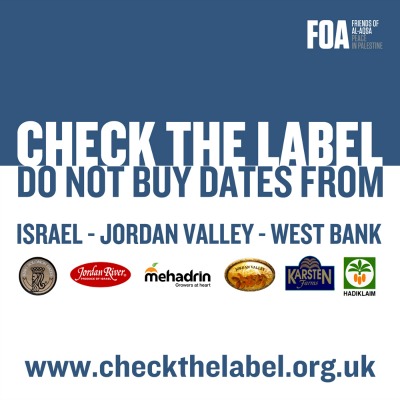
After the 1967 Six-Day War when Israel captured the Jordan Valley from Jordan, tracts of land were taken from Palestinian farmers and allocated to settlements and military camps. According to the Inter Press Agency report, the Jordan Valley holds 28.3 percent of the West Bank’s land, and is ‘the largest single Palestinian territory under full Israeli military and administrative rule, classified as Area C since the 1990s.”
Only 13 percent of the valley is under Palestinian rule, known as Area A. In 2005, Palestinian civil society issued a call for a campaign of boycotts, divestment and sanctions (BDS) against Israel until it complies with international law and Palestinian rights.
Hani is a Palestinian American who lives in Northern Virginia. He often shops at local halal grocery stores. “When I saw the [Israeli] items on the shelf, I asked for the manager and I brought it to his attention. Weeks later they remain on the shelf. As a Palestinian, I find this offensive....when non-Muslims are boycotting Israeli goods to support Palestine and [our] Muslim grocery stores sell these goods, it's an insult,” says Hani. He says that they sell Israeli dates--labeled as Jordan Valley--and pickles that are made there too. His friend who grew up in Jerusalem and reads Hebrew picked out a can of Galil pickled cucumbers, which is sometimes not marked as an Israeli product.
A local store manager said that often they do not know where the products originate from and that he checked in the store but did not see that brand of dates in the store currently.
Hani just returned from the border of the West Bank and Jordan where he works with a relief organization. Everyone in his contingent entered West bank, all his American colleagues, except him. He was stopped and interviewed for six humiliating hours and then turned away. His American passport could not give him access to see his mother and the rest of the family. “It reminds me of what the Nazi used to do. They have a number for me when I go, because I was born in Palestine. They like to play games and harass people like me.”
The last time he saw his mother was in 2009, when he entered through Egypt. “There is no other way for us to get back to the West Bank,” he says. The Egyptian government gives diaspora Palestinians a 3 day notice in which they have to book tickets to enter through Gaza. Every time someone enters, there is no guarantee that they will be able to leave as the border can close indefinitely.
Hani’s family is from Beit Lahia, a city in northern Gaza. He says that Israeli companies come and buy the strawberries from there and sells them under two different packages, according to where the BDS movement is stronger, such as in Europe. The product marketed there says product of Palestine “It's a scam.....look at their website it says Israel...nowhere does it say Palestine. They are just using the Palestine thing for marketing.”
Sometimes the packaging says ‘grown by Palestinian farmers’ and this refers to Palestinian ‘slave’ laborers on Israeli plantations. According to the Associated Press, Israel has played down the impact of the BDS campaign by Palestinian activists, but it has turned into a harsh reality for the economy. Recently Oxfam, the international aid organization and their former ambassador, actress Scarlett Johansson, were in the news over the showdown over Sodastream, another Israeli company operating in the settlement. Public pressure forced Oxfam to drop Johansson after she became the model for Sodastream.